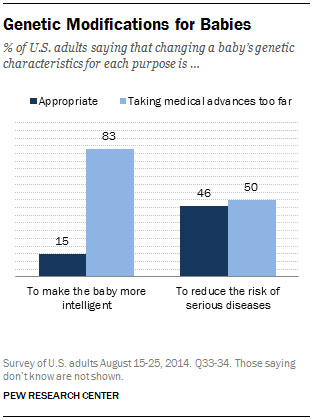Public and Scientists’ Views on Science and Society
Cary Funk and Lee Rainie, Pew Research Center, January 29, 2015
{snip}
Modifying a Baby’s Genes
The survey also asked the public about two possibilities in the realm of genetic modifications. One question sought people’s views about changing a baby’s genetic characteristics in order to make the baby more intelligent. A separate question asked about changing a baby’s genetic characteristics in order to reduce the risk of serious diseases. Public views about the appropriateness of genetic therapies of this sort differ widely depending on the circumstances considered.
An overwhelming majority of adults (83%) say that modifying genetic characteristics to make a baby more intelligent is “taking medical advances too far.” Just 15% say this would be an appropriate use of medical advances.
By comparison, fewer are negative about genetic treatment to reduce the risk of serious diseases. But opinion about this circumstance is closely divided, with about half of adults (50%) saying genetic changes for this purpose would be taking medical advances too far and a nearly equal share of 46% saying this would be an appropriate use of medical advances.
Patterns Among the General Public
Women are a bit more negative than men about genetic modifications to reduce the risk of serious diseases (54% among women vs. 47% among men say this would be taking medical advances too far). Strong majorities of both men and women are opposed to modifications aimed at increasing a baby’s intelligence, although opinion is more negative among women (87%) than it is among men ( 78%). There are no differences, or only modest differences, in views about genetic modification in these circumstances by race, ethnicity, or education. Younger and older adults also tend to hold similar views on these questions However, those under age 30 are a bit more likely than older adults to say that changing a baby’s genetic characteristics in order to reduce disease risk is appropriate.
{snip}
















